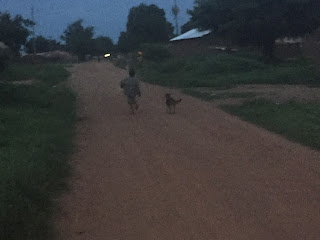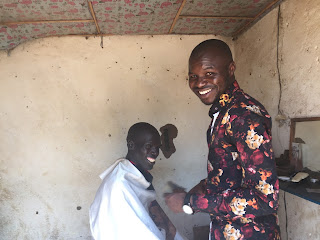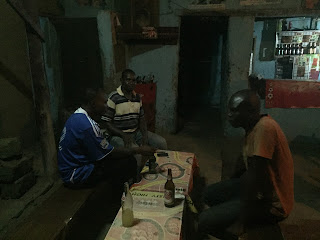Hey everyone! I finally finished a project I have been wanting to do for a while. I often ignore my blog completely and so now, I am trying something big. I wanted to do a photo project called “24 hours in Mbakaou” to show bits and pieces of life in my community. Because my camera is only so good at night, I decided to make it “20 hours in Mbakaou” instead. In this project, I am attempting to give you snapshots of life here and describe it along with the photos. This project is not at all a perfect or nearly full representation of life here, just bits and pieces. I hope you enjoy these and if you have any questions or want more details, please just tell me. This all took place on April 22, 2016.
Mbakaou is a town/village of about 4,000 although the population fluctuates through the year. Mbakaou settled in its present location back in the sixties after the construction of the dam that created Lake Mbakaou by an American company. Since that time, Mbakaou has become the epicenter of fishing trade in Adamawa and the East. About half the population is Muslim and the other half is Christian, and there are four main ethnicities: Gbiya, Fulani, Hausa and the Emboro. I will save the rest of the information for the photo descriptions. Enjoy!
4 am - A sleeping village
Around 4:30, you can hear very little in the center of town except perhaps a few testing sounds coming from the mosque before the 5:30 prayer. It is what you see that is interesting. An empty well lit town full of goats sleeping on the main road. I have often felt you can learn so much about a city late at night or early in the morning and the same is true here. Like most African villages, there is no question of poverty, but Mbakaou is better off than many as one can tell here. For starters - the lights. No one is present at this time but they can afford to keep the lights on (and they have lights) because of the nearby power plant that is essential for the nearby dam. For a rural village of 4000, this is a somewhat unusual blessing. However that is not the only source of opportunity in a village centered on fishing and in a fertile piece of cattle country. Some villagers have enough money to own goats, sheep and cattle, which can be a symbol of success. Other Peace Corps Volunteers who have visited my village have noted the sheep and goats who take over the village night and day (especially night) as their villages often lack this symbol of relative prosperity.
5 am - Ruins of Good Foreign Hearts
An hour later, morning prayer is finished and one can hear the town awake. Buckets hit well water, doors open, dogs bark and farm tools clutter together. Work starts around the house and some prepare to go to their fishing boats or to their farm in the bush. One place they are not going to is here; what the locals call the ceramics factory. Built in 1987, it was apparently an aid project from Japan. They were to build a workplace someone was supposed to work at, but now, it is a collection of abandoned ruins outside of town. Aid projects are usually well intended but if not planned for sustainability often fall flat or even cause problems for the locals it intended to help. It also sets an idea that foreigners are here to give things. My job in the Peace Corps is to train on health issues and give them new ideas and information, but after aid like this, we can be seen as sources of profit. I wonder if in some bureaucrat and corporate executives office in Japan, this is noted as an accomplishment. I don't blame them if it is, but they should have followed up on the project.
6 am - Sacrifice
At 6am the town is up. Also today is Friday, and so, many children and teenagers flock to the houses of muslim “grands” in town. These include successful businessmen, chiefs and Al-hajis (men who made the Hadj to Mecca). Each Friday morning, the grands distribute a small “sacrifice” symbolizing Abraham's sacrifice in the Bible/Koran/Torah. The children here are receiving a few beniets before school. It may seem small but it symbolizes how villagers in the town look after each other. Orphans are often taken in by neighbors. Strangers invite people to dinner and the chiefs and grands sometimes organize fundraising for projects without foreign and government assistance or help. These strong community values are still held firmly in these villages despite great poverty.
7 am - Off to School
Oh yes school. A burden to children everywhere, until they get older that is. Throughout Cameroon, you will see new school houses sitting next to decaying ones as part of the governments goal to provide education throughout the country. Primary school is free except a $3 a year fee plus the costs for uniforms and school equipment. Secondary school on the other hand, cost each student (or their family) about $30 plus uniform and equipment. Pre-School cost s about $20. Despite the government funding, there is still a need for parents to pay for school and ensure their kids go. Male teenagers often drop out to become fishermen and girls drop out for marriage or because of pregnancy. Those who complete school have more opportunities but often it requires them to leave town. High schoolers wear black, elementary school students wear blue and pre-schoolers wear pink.
8 am - The Meat Market
Mbakaou, although famous for fishing, is in the center of cattle country. Some villages slaughter one cow a week, but in Mbakaou, freshly butchered meat is always for sale on top of wood tables in the open air with flies dancing all around. There is a main butchery with always at least one person present, but on and off through the year, entrepreneurs will prepare skewers of meat to sell as street food or fast food. Whenever I have tourists, I take them to the butcher before taking them to feed the crocodiles that one of the villagers keeps as pets (sort of).
9 am - The Health Center
This is technically where I work. Even though I do most of my real work out on the town and in small neighboring villages, this is where my counterpart and the town nurse (pictured) can be found along with terrified children waiting for shots (also pictured). This was originally constructed under the organization of a former Peace Corps Volunteer who served 12 years ago. Unlike the ceramics factory, the community chipped in by providing the materials and it has been proven sustainable as it is still fully functioning 12 years on.
There was a village Mbakaou before the dam, but much of where it was is now lake. The new town was built around the dam and the fishing it provides. The dam filters water to a hydroelectric plant down the river and requires a power plant nearby. As a result, this village of 4,000 sometimes has more consistent power than the capital city. I always find the dam an amusing sight since it looks so out of place from its surroundings. There are problems too. Man made lakes have proven a significant cause of malaria, which the villagers struggles to combat.
11 am - Out on the Farm
As I wandered back from the dam, down by the river, I stopped by the farm of the family with whom I live. There was Ouma and another woman working on the farm to cultivate peanuts, manioc, maize and other foods to sell and consume themselves. They even brought baby Aisha to sit under the tree so that Ouma could watch her as she worked. This is backbreaking labor that is often done by the women of the family while men do other jobs or sit idly in town. Women are expected to take care of the children, the household chores and do extra income generating work.
12 pm - Chilling in the middle of the day
If it is not raining, it gets hot this time of day and like in southern Europe, some people take a break to relax. If they are working far out in the fields, they may not come back but if they are close they might as well spend time with the family. Same goes for the students and children.
1 pm - Friday Prayer and Muslims
Muslims are expected to pray five times day, though not all do. If a Muslim prays at a specific time and day, it is Friday at 1:30 pm. Mbakaou, which is only half Muslim, seems to shut down as young boys to elderly men gather to pray at the main mosque at the center of town. During Ramadan, the town becomes far less active as all the Muslims in town partake in fasting throughout the day. When women pray, it is often at home and not in public as according to the local gender norms.
2 pm - Keeping Shop
Shops line the main street through town and are often run by the most prosperous of the villagers. These include men who run basically general stores for food and supplies, equipment stores, barbers (like my good friend FBI), small restaurants and even specialty shops like one that sells veterinary medicine. There are also credit booths where one buys credit for cell phones instead of phone plans like in the US. Also, Saturdays are market days, and therefore, more items for sale can be found such as clothes and household goods.
3 pm - Church and Christians
As I mentioned earlier, Christians make up about half the population and like the Muslims, they take their beliefs very seriously, and churches are filled every Sunday and especially on holidays. Like Christianity in other parts of the world, there are local influences in the faith. You can often hear the choir of the evangelical church practicing hymns in a local style. Since it is Friday, there is not a lot going on in the Christian community faith wise, but one can still visit the the churches in small towns including one that is Catholic and built with stones and the Presbyterian Church, that from a distance looks like a house. The walls and roof are made from thatched materials and the benches and alter are made of mud brick. I think it is quite cool.
4 pm - Fishing
This town was founded on the dam, but it lives and thrives on fishing. During fishing season, which runs from April to July, the towns population increases, cars make regular trips between Mbakaou and the major town of Tibati and fresh grilled fish caught that day can be easily purchased for less than a dollar. Once Peace Corps Cameroon posted on Facebook about the quality fish in my village, and a Cameroonian commented that I should go to Ngaoundere for the best fish. I did not have the heart to tell him that the fish was almost certainly from Mbakaou, and probably a couple days old. Mbakaou ships fish all through the Adamawa and the East and has earned a reputation for it. Problems arise with the population influx, however. The prevalence of HIV and other STI’s have been linked with fishing villages across Africa especially centers like Mbakaou.
5 pm - Traditional Leadership
One of the most cherished parts of Mbakaou for me is the successful coexistence between Muslims and Christians. This is shown in the traditional leadership. Elected and appointed leadership technically extends to Mbakaou from Tibati but the local leadership is by traditional chiefs. There is a chief of the Christian Gbiyas, the chief of the Muslims (Fulani, Hausa, Muslim Gbiya and Emboro) and the chief of the Emboros specifically. Even though in these pictures the wonderful Chief Martin of the Christians and the two very kind Muslim chiefs are pictured separately, they work together to solve problems and serve as a passive leadership in Mbakaou.
6 pm - Dinner
Every night I eat couscous (the Cameroonian couscous, not Moroccan couscous) and sauce with the family of Al-haji Awal. The meal consistently consists of balls of doughy couscous to be dipped into a sauce, which is different every night, with some beef or fish. As tradition dictates, we eat with our hands and women eat separately from the men. Awal’s two wives prepare the dinner for the whole family and myself.
7 pm - Night Market
At 7 pm, many in town are out and about and the market is lit up with lanterns. Most have dinner at home, but some especially young men who live alone, can buy fish, beef, couscous and other foods for dinner. This is a perfect time to get a grilled fish caught that day for 60 cents or less. Also some go out to buy food for the next day (like me).
8 pm - Nighttime Entertainment
It is Friday night and like in many towns across the world, the residents here go to the movies and listen to music in public areas. Shops blast music and in mud brick buildings, pirated films are shown on small television screens for a small fee. Other places have video game rooms and there are rooms for different soccer fan clubs. Many however just stay home and watch TV with the family. This is one of the benefits of having lighting at night. On weeknights, students stay up to do homework but I am often disappointed in the lack of pleasure reading I see in town, even in peoples homes.
9 pm - Another Type of Nighttime Entertainment
Then there are of course the bars. This is another popular form of entertainment in town, not just at night but like in the states at least one will be open during the day. There are about four permanent bars plus occasionally more pending on who is trying to make money selling alcohol. All sell cheap beer and dirt cheap plastic sachets filled with alcohol and some make traditional alcohols as well such as palm wine or honey wine. Alcoholism can be a real problem in Cameroon especially with men and although it can be cheap it is still a serious drain on many already poor families financial capabilities. Still the bars are a place for gathering and getting to know those in the community.
10 pm - Mosquito Nets
Malaria is one of the greatest problems for the people of Cameroon, but especially in Mbakaou and the other communities surrounding the lake. Studies have estimated that 3,000 children die each day in Africa from Malaria and one study said 660,000 died from malaria in Africa in 2010 alone. Until a vaccine is created, residents have to actively fight the spread of the mosquito borne virus every night. They are recommended to avoid going outside at night without long clothes, closed shoes and mosquito repellent. It is also advised to have netting on the windows and clean up bushes and puddles around the house. Mosquito nets are the most effective form of protection providing full nighttime protection. It can be difficult however to persuade residents to use them, and they complain the nets become too hot or in the way to use every night. However, it is important they do because they save lives.
11 pm - The Concession
Home sweet home. Cameroon is very family focused, and families often build their houses together like wagon trains at night forming a circle in the middle. I live in a nice concession of an Al-haji with a large stone brick wall, four different houses, plus extra rooms, a well and a large bronze door (see some of the pictures at 12pm). Crime is not too bad in town but every now and then, there are thieves or other types of trouble makers and it pays to have an outer wall. Especially when I am gone or asleep.
Epilogue
I know the essays were brief and this no way a full or even appropriate description of Mbakaou, it was a fun attempt to show my village to those who are interested and even learn some new things myself.


































































